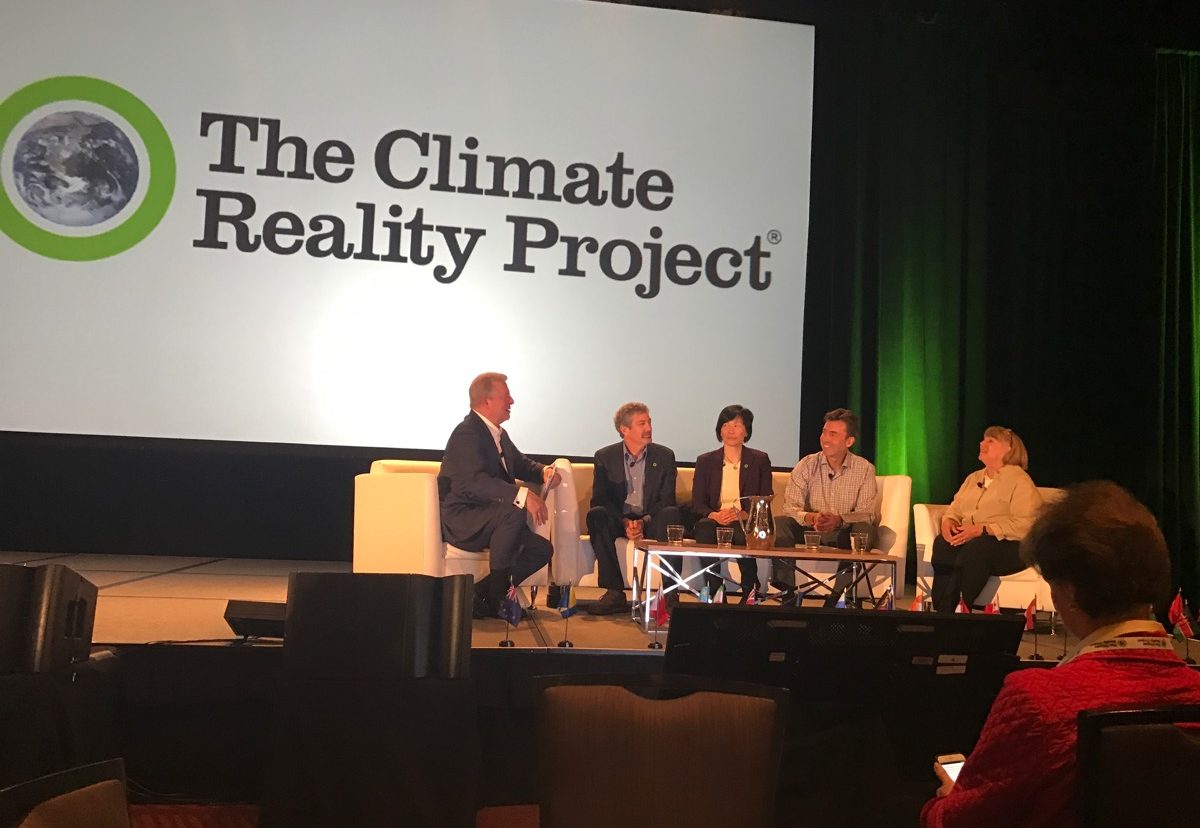By Belinda Chin
Climate Reality Leader Training Denver 2017
Climate Reality Mentor Seattle 2017

Belinda Chin (center, on stage) with Al Gore and other panelists.
It was the third day of Climate Reality Leader (CRL) training in Seattle, and I was backstage with three other volunteers anxiously waiting for our session moderator, the founder of the Climate Reality Project, Al Gore! The four of us were graduates from previous trainings across the country, and were chosen to be mentors for the incoming class of CRLs. In addition, we were pleasantly surprised to receive an invitation to be on this panel. The purpose of the session was to demonstrate to the trainees how current CRLs champion a sustainable future without fossil fuels.
We were clipped in with lapel microphones by the time Mr. Gore arrived backstage. The election of a climate change denier to the presidency prompted me to recommit to protecting the environment. It was a no-brainer to join the Climate Reality Project. Throughout the experience, I’ve found Mr. Gore to be deeply committed to building a global force to collectively heal the earth of climate change. He speaks often of the work and accomplishments of CRLs.
I’ve always had an interest in the intersectionality of institutionalized racism, the environmental movement, and climate change. I learned there can be no sustainability without equity. In 2012, I co-founded the Seattle chapter of the Environmental Professionals of Color (EPOC), a program of the Center for Diversity and the Environment (CDE). The work of CDE and EPOC is to harness the power of racial and ethnic diversity to transform the U.S. environmental movement by developing leaders, catalyzing change within institutions, and building alliances. After training, I sought to build a network of support for CRLs of color through EPOC and CDE.
I am the daughter of Taishanese immigrants, who left their homeland to escape war-shattered provinces and agonizing poverty. Growing up near a tidal estuary amid a symphony of saltwater aromas and wetland accents, my childhood tide pool wanderings led to a degree in environmental science. Intermingled with childhood memories are TV images of the violent backlash to the Civil Rights Movement, the hell of the Vietnam War, and the burning of the Bronx. This gave rise to a career committed to civil service because I believed in government as an agent for change, aspiring to the ideals of the Founding Fathers. As it turned out, government made a change agent of me.

Belinda Chin (center) with APAPA interns at Climate Reality Leader Training on June 29.
While serving a vast diversity of people as a government employee, I could not ignore the historic and continued marginalization of people of color in too many aspects of life … employment, wages, housing, and education to name a few. Notable was the disenfranchisement of people of color from decision-making for and about their environment — the places where they live, work, worship, and play. Research confirms that the most vulnerable communities anywhere are the most negatively impacted by climate change, and have the least access to decision-making power or to the benefits of solutions.
I’ve come to realize that hate has a carbon footprint. Little did my parents know they entered a country founded on stolen land, worked by stolen and enslaved peoples, and informed by institutionalized racism and discrimination. They arrived in the United States expecting to be welcomed to the Gold Mountain, and were instead met with indifferent tolerance. They became ghosts.
My family traveled everywhere by our gas-guzzling car during the Vietnam War era. It was unsafe to take public transportation or walk for fear of being mistaken for “the enemy” or angrily perceived as “the other.”
We could pass quietly and quickly through unfriendly neighborhoods. Sadly, even the car could not always shield us from being flipped off or cussed out.
I often reflect on what kept my parents grounded and resilient through those turbulent times. A significant factor was access to their native foods. Their food connected them to their homeland and to the memories of the people and land that lifted them up with love. My mother lovingly kept a garden using methods her mother taught her. These methods went back generations to time immemorial to Creation when the Ancient Ones, the plant and animal elders, lovingly shared their knowledge of survival with my ancestors. That deep and old love was shared with me. I grew up knowing food is love. I think of my mother as an “Earth whisperer” because of how she could coax an abundance of vegetables to grow out of the ground.
Over time, my family drove thousands of miles in many cars. Over time, the stress of conflict and all the hate they swallowed caught up in my parents’ bodies. My people believe energy flows through the body when healthy. When energy gets trapped in vulnerable spots, you get sick. My father’s heart failed just before he retired. My mother’s life was taken by cancer that originated in her throat and spread throughout her body.
As I sat on stage with my Climate Reality peers and Al Gore, I resolved to share this story of why I’m a part of the climate change movement. I do this work to honor the sacrifices of my parents and all those who came before me, and to uphold their knowledge and love of the Earth. I do this work for today’s young ones so their future is not sacrificed, and so they have a heart, voice, and choice in the direction of the country and environment. Hate has a carbon footprint. Listen to the Earth whisperers.


